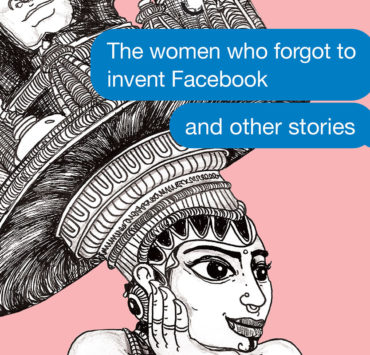Annie, who was originally called Miranda, worked as a policy analyst at the New Zealand Treasury. It wasn’t the world’s most interesting job, but it could have been worse. Annie often used this statement to shut down small talk. But this strategy did not work at family gatherings: her relatives had weaponised banality, killing conversations with empty sentences, reloading with each other’s dreary lives. Particularly Uncle Roger.
Annie noticed that the man on the bike in front of her was wearing translucent white Lycra shorts.
The Smith family met on the second Wednesday of every month. It was a tradition, and adherence to tradition was one way the Smiths clung to their English heritage. Another was the unspoken rule that U.K. political biographies were given as birthday presents. Thanks to her Aunt Emma, a fifth-generation New Zealander who inexplicably spoke in an upper-class English accent, Annie kept the local op shop stocked with mint volumes on Churchill.
Annie, who hadn’t seen a naked man for months, stared unabashedly at the man’s perfectly toned, fully visible behind.

Annie ordered a genetic test online. She spat into a tube for an eternity and went to the post office, dry-mouthed. SALIVA SAMPLE, she wrote in bold capitals on the customs declaration. The cashier gave her a bored, sideways glance, like she might not be normal: this delighted Annie.
With a double major in Art History and Economics, Annie felt qualified in labeling this man a second coming of Michelangelo’s David.
The results came back >99% British and Irish and <1% Broadly Southern European. “What did you expect?” her mother said, thinly, Elgar playing in the background. Thanks to Uncle Roger, the keenest of the family’s genealogists, nothing remained a mystery after 1474. Even the Southern European anomaly. Edmund Archer had been born in 1579 to William Archer, of Bristol, and some temptress from Sardinia, who had lured him in with her sultry skin, her dark hair. “Those Mediterranean girls,” Uncle Roger said after a fact-finding trip to the island, “they haven’t changed in 427 years.” It was a Smith Wednesday and he was speaking in hushed tones to Uncle Gareth, the sleaziest of the uncles. The then teenage Miranda (not yet Annie) had wondered if this meant Uncle Roger had been unfaithful to Aunt Margaret. The adult Annie had hoped that, if Uncle Roger had indeed been so unscrupulous as to have an affair with a Sardinian, he would have had no compunction in fudging the family annals. After all, the Johnsons of Essex had managed a sugar plantation in the Caribbean. Annie had long-fantasised about descending from a child born of forbidden love between a Johnson and a slave, a child conceived with the heavy scent of frangipani on the air, the tremulous beating of hummingbird’s wings matching those of the lovers’ hearts. The genetic test confirmed that Uncle Roger conspired in nothing: in Annie’s online Ancestry Composition infographic, the British Isles pulsed the true blue of Queen Elizabeth II’s eyes.
The light turned green and Annie discovered that keeping up with a man in possession of such powerful buttocks was not an easy task.
On her 27th birthday, Annie (then still Miranda) decided that Miranda was a name for an uptight prude. Back then, she was both these things and longed to be neither. After she made her announcement, her parents observed her in muted anger from their armchairs. The lounge suite had been reupholstered in a floral pastel to match the reproduction of Sisley’s Regatta at Molesey, purchased at the gift store of the touring exhibition The Impressionists in Britain, that hung above the sofa. Her parents accused her of disrespecting Miranda, who had died in childbirth in 1737, and Miranda, who had been impaled on an oak tree in 1846. The family tree had yielded Mirandas like a plum tree bears fruit after a frigid winter: abundantly. As they climbed further and further out, plucking more precarious relatives, Miranda (Annie fast-emerging) let out a shriek. After meditating on the willow-green carpet at her feet and telling herself that this feeling of claustrophobia would pass, she pointed out that, with so many Mirandas meeting premature deaths, it would be suicidal not to change her name. Five years on, Uncle Roger was the only one who continued to boycott Annie: he said Miranda often, loudly, keeping her memory alive.
Flushed red with exertion, Annie urged her bike forward in pursuit of the sublime-arsed man.
If a man so much looked at Annie with anything resembling sexual interest, her face froze and she held her arms close, as if pasted, to her torso. One weekend, while her friends were on dates, Annie, rather late to the Hunger Games party, read the whole trilogy. She spent the next six weekends at Archery for Beginners. When the course was over, the instructor, Richard, an ardent medievalist, invited her out for a drink.
Annie noted how one cheek eased down into the shadowy crevasse of the man’s crack to meet with another, which, in turn, rose out in an equally revelatory arc.
“Flushed red with exertion, Annie urged her bike forward in pursuit of the sublime-arsed man.”
Annie and Richard’s first date was charged with possibility. On the second, after dining at Genghis Khan, an all-you-can-eat Mongolian restaurant, this promise was diffused with anti-climactic sex. Annie vowed never again to sleep with someone so soon after consuming such a large pile of red meat. She agreed to a third date, against her better judgement, and found herself at a jousting tournament.
No man she had ever dated came close to this cyclist’s physical flawlessness.
Richard bruised his tailbone falling from a friend’s mare when it broke into an unexpected trot. Later, they got drunk on mead in the scrubby reserve. “The parapet is my steed, the bow my lance,” Richard shouted in defense of his poor horsemanship. “Knave!” his friend shouted back, before turning to throw up in a barrel. Drunkenness and a narrow campervan bed did not improve the sex. As he gingerly thrust, Richard panted “I’m Your Lionheart”. When Annie suggested, not without a hint of cruelty, that she should have packed her Maid Marian outfit, Richard mis-read her tone and emitted a “Yes!” so strangled it sounded as if he had won the lottery while attempting to swallow a medium-sized potato.
Annie’s breathlessness peaked as she followed the man over a small rise while concurrently imagining his body pressed against hers.
Annie was not lying when she told Richard she could not stand chemical toilets. She wandered deep into the bush disguised in the lie of needing to piss (Miranda would never have used that word) and found a stump on which to sit and laugh hysterically. Returning to the campervan, Annie let Richard hold her despite the fact she knew she would not be returning his calls.
Was this man aware that he was so alluringly naked?
Annie’s father did not approve of the fact that Annie, at 32, still took the bus to work. “A man who, beyond the age of 26, finds himself on a bus can count himself a failure.” Both her father and Uncle Roger adored Margaret Thatcher, gifted each other copies of Not for Turning and Everything She Wants, and quoted her often. One of the few times Annie had seen her father cry was when the Baroness’s coffin was carried into St Paul’s Cathedral.
The stranger’s hard body lost none of its potency as it drew further ahead.
For Annie’s next romantic adventure, she plunged deep into parts on the internet where Miranda would never have dared venture. I.WANT.U’s profile picture did not show Annie’s face, but she made no attempt to hide her identity during online trysts with anonymous men. She found thrusting her crotch at a webcam to be neither comfortable nor erotic, but it certainly dispelled any doubt in her mind that Miranda was over: purged, dead, buried. At work, in her open-plan office, computer fans whirred as she and her colleagues wrote reports and memoranda. Annie felt so aroused by her secret online life, in particular how shocked people would be if they found out about it, that, one tea break, she went to the 13th floor and masturbated in a toilet stall.
The arse-god in invisible shorts turned left, taking a route around the many bays of the peninsula.
I.WANT.U turned out to be short-lived. One Tuesday night, splayed over her laptop, imagining she was a spider over a fly in a web, Annie’s leg disappeared down a crack in her sofa, an overstuffed salmon pink 21st birthday present from her parents. The angle was bad and a popping sensation was followed by excruciating pain. Felixdoggydogdoggy, in a suit in an office in Singapore, started to laugh. Through her pain, Annie became aware of other voices, other laughing voices, off-screen.
Annie, her cunning sharpened by lust, turned right and entered the tunnel that cut across the narrow base of the peninsula.
Annie deleted I.WANT.U’s profile. When she finally limped back to work, she told people that she’d dislocated her knee helping an old lady off the bus. She cried in the bathroom on her lunch breaks.
Annie practiced the different inflections she might use when propositioning the man.
On her therapist’s recommendation, Annie started taking long coastal walks to reflect on what really mattered to her. Heralded by the spinning of many wheels, laboured breath, and snippets of shouted conversations, her contemplations were often interrupted by men who rode in packs, clustered together in the hope that perhaps, collectively, they could ward off aging bodies and emptiness. Lycra, Annie concluded, was an unhappy fabric.
“Nice aaarsse!” Annie said, emphasising the arse. “Niice arse,” she went on, emphasising the nice.

On Wednesdays, Uncle Roger droned on and on about cycling, most recently, the expense of his new, ultra-light, carbon fibre frame. He filmed every single ride on a GoPro; a screening titled Highlights from the Collected Cycles of Roger Smith was already marked on the family calendar (once entered, inevitable, like death). One year, at the Christmas edition of Smith Wednesdays, which took place on a Saturday to accommodate drinking during staid caroling, Roger got tipsy and listed the many joys of padded cycle pants.
Annie stopped where the ocean lapped at the sea wall and let the air out of her front tyre.
Annie’s coastal walks aggravated her knee injury and her physio recommended she take up cycling instead. Though worried she might be seen as following in Uncle Roger’s footsteps, Annie went to the bike shop. She purchased a heavy, Dutch-style commuter bike. She biked to work every day. Her body became lithe and hungry, her thoughts clear. She flirted while locking and unlocking in the departmental bike sheds. She freely ogled men.
And there he was, the powerhouse at the fork of his body propelling him around the bay towards her.
“Miranda!” Uncle Roger did a U-turn and dismounted. The man Annie had pursued for the past twenty minutes shot by. “We hired bikes just like that when we toured the Cotswolds.” Uncle Roger looked mean and bony in his Union Jack Lycra. He put his hand behind his back, fossicked in a zippered pouch, and held out a puncture repair kit. “How’s everything going at that job of yours?” Annie did not say anything. She did not take the kit. Instead, she picked up Uncle Roger’s bike and threw it over the wall and into the ocean. Uncle Roger blinked in shock. Annie stared back at him with disarming confidence: “My name is Annie!”








